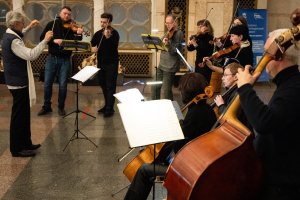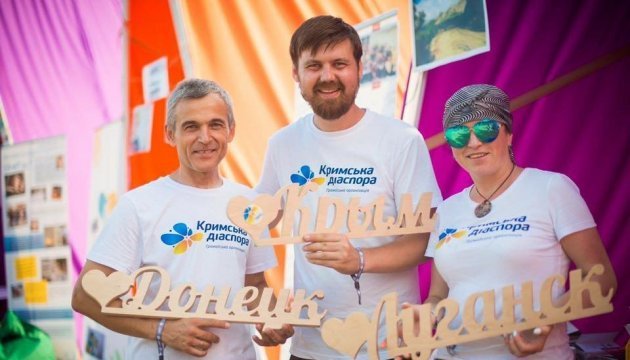
Crimea. People of Сharacter
natural sights and architectural monuments. First of all, these are people of character, individuals who are able to see the problems of society, find a solution to them and help those who need support.
The fact that occupation of Crimea has brought many problems to the Crimean community and forced people to leave the peninsula is well-known to them, because they themselves were among those who had to sacrifice their love for their homeland.
Our today's story is about Crimea through familiarity with public organizations CrimeaSOS, Crimean Diaspora and Crimean Tatar Resource Center, which solve the problems of internally displaced persons from Crimea and Donbas and in different ways seek a common goal - de-occupation of Crimea.
CrimeaSOS
CrimeaSOS began its operation in Ukraine long before pro-Ukrainian residents of Crimea started leaving the peninsula. The annexation of Crimea, which has been reported by Crimean activists since February 26, 2014, the day of a mass protest rally against Russia's arrival in Crimea, has become the platform of the future organization.
CrimeaSOS head Tamila Tasheva says that on the basis of those chronicles one can write a book about annexation of Crimea. The activists, who had not yet created their organization, met the first internally displaced person in February 2014. In those days there was no office, there were no rules, and there were no laws. There were only confusion and fear. In these conditions, CrimeaSOS helped those who needed to leave Crimea for mainland Ukraine or, on the contrary, to get from Kyiv to occupied Crimea.
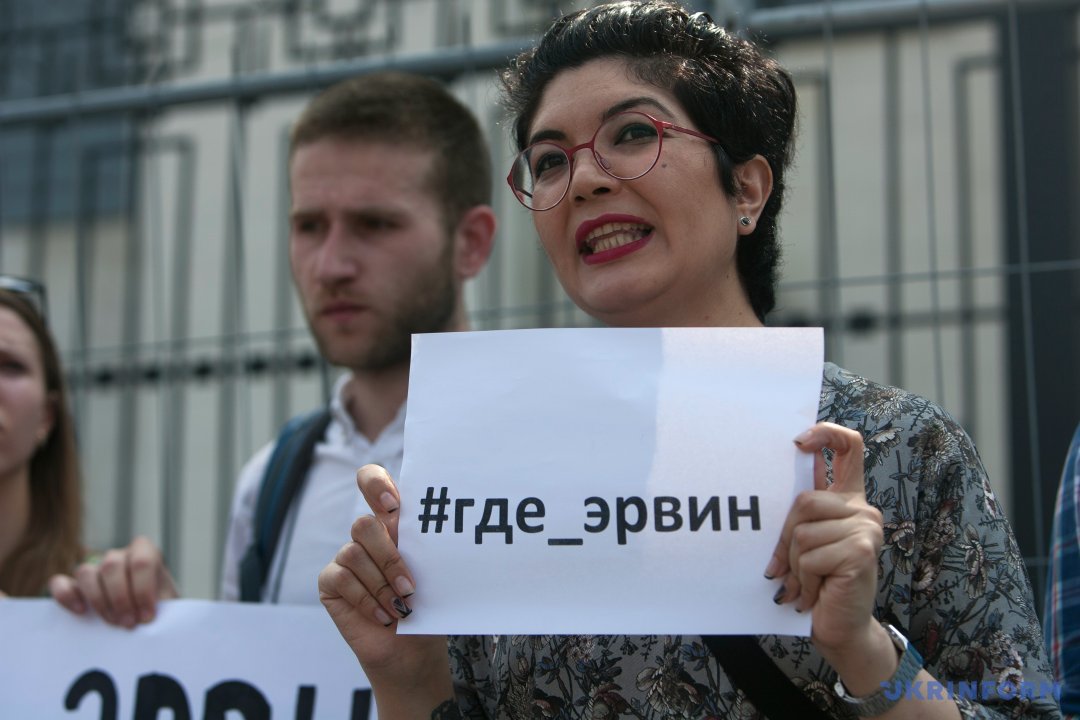
Later, having started to work with international organizations, CrimeaSOS organized social, legal, educational and psychological assistance to IDPs.
The second priority of this public organization is the strategic work on Crimea's return to Ukraine.
CrimeaSOS is in constant contact with human rights defenders and lawyers who participate in the trials of Ukrainian and Crimean Tatar activists, victims of religious persecution. They organized the collection of letters and appeals in support of political prisoners and their families so that people would not be isolated.
Every month, from July 2016, they hold a rally "Where's Ervin?" outside the building of the Russian Embassy in Kyiv, during which they tell about people who disappeared in Crimea. Despite the fact that the windows of the embassy and the gates to the building are always tightly closed, CrimeaSOS activists are persistently trying to reach Russia and have repeatedly made clear that they will not retreat until they get an answer about the whereabouts of their 16 missing comrades. In total, 43 cases of violent kidnapping in which the "authorities" are involved were recorded in occupied Crimea. Someone of those missing was found dead, someone was found alive, but the fate of 16 people is still unknown. On this occasion, the organization sent statements to the embassy and drew a symbolic pit outside its building, in which politically active Ukrainians disappeared. Activists last asked their questions to the staff of the Russian embassy in the deaf and dumb language. There was no response to any of the rallies held, but this does not mean that CrimeaSOS will not seek new ways to reach representatives of the occupying country. The organization participates in international forums and believes that de-occupation of Crimea should be influenced by a combination of causes, the main one of which is international pressure on Russia and sanctions against it.
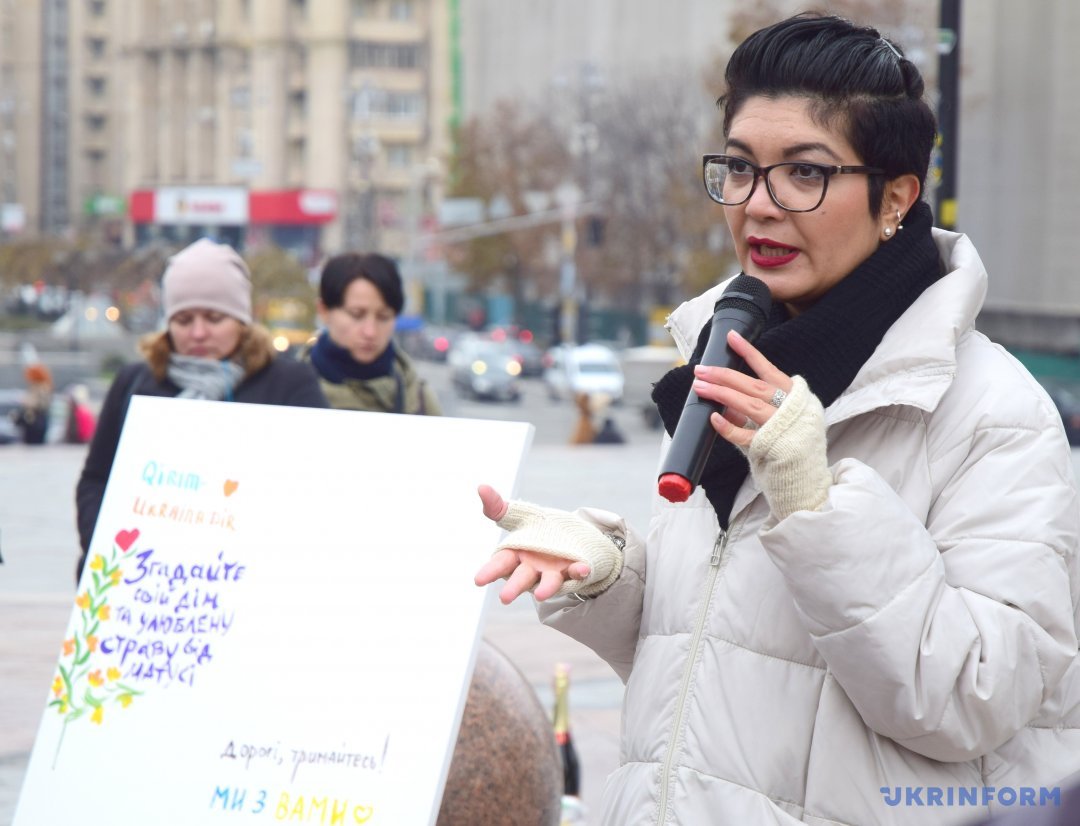
With the same goal of informing the international community in 2015, CrimeaSOS created an interactive map of human rights violations in occupied Crimea. It recorded more than 400 cases of violations of rights and freedoms in Crimea - disappearances of people, illegal arrests, trials, cases of violence and other persecutions.
Tasheva believes that the main goal of her organization is the liberation of Crimea from Russian occupation by winning the minds of Crimean residents and returning the territory.
"There's no doubt that we need to defend people, fight for their minds, but this does not mean that we should not return the territory. One does not exclude the other," she said.
Therefore, CrimeaSOS has two areas of work, in particular, the human rights and legislative aspect and the social aspect, where, along with humanitarian and legal assistance, many cultural projects are implemented.
The head of the organization became the producer of the documentary "Mustafa" about the life and struggle of the leader of the Crimean Tatar people, Mustafa Dzhemilev. In November 2017, at the international film festival in Kyrgyzstan, this film (directed by Akhmed Sarykhalil) received the award as the best film about human rights and freedoms.
Crimean Diaspora
Crimean Diaspora was officially registered in Kyiv in the summer of 2014, but the people who created it started to leave Crimea and unite in mainland Ukraine before and after March 16 - the day of the "referendum on the status of Crimea."
The head of the organization, Anatoliy Zasoba, arrived with his family from Sevastopol.
When asked why the community that regards the peninsula as being part of Ukraine received the name of a "diaspora," Zasoba responds in detail – obviously this question is being asked to him not for the first time.
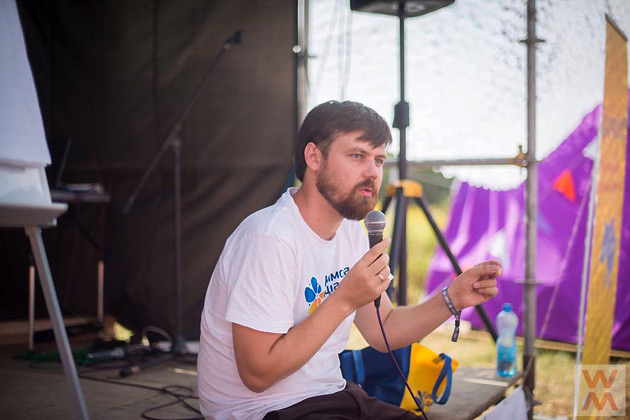
"First, Crimean Diaspora was created on the principle of a fellowship, but since the fellowships that had already existed in Kyiv at that time, created by oligarchs and former Party of Regions MPs, discredited themselves and distorted the meaning of this word, we, in order to differ from them, called ourselves a "diaspora." This word is clear to people who were isolated and wanted to support each other. It seems to sharpen the cause of our problem – Russia's annexation of the peninsula. In addition, the status of the Autonomous Republic of Crimea - a republic within Ukraine, gives us the right to believe that this is not an ordinary region in the country," Zasoba said.
The organization has expanded from 2,000 people in 2014 to 15,000 people now, including a thousand of them who are financially active members of the community, whose contributions, UAH 600 per year, keep Crimean Diaspora afloat. About 80% of members of the organization are IDPs from Donbas.
It so happened, according to Zasoba, that there are more than ten public organizations in Ukraine per 50,000 IDPs from Crimea, and only a few organizations per two million IDPs from Donbas. According to the head of the Crimean Diaspora, activists from Luhansk and Donetsk are communicative and literate people who work perfectly in the team.
According to him, the original purpose of the organization was to solve the problems of people and provide them with social assistance.
"The main thing is people, and the struggle for Crimea is a struggle not for territory, but for people. If Ukraine does not win, first of all, the struggle for people, it will lose the struggle for Crimea. Therefore, we are fighting for the hearts of Crimean residents and we support our fellow countrymen as much as we can, defending their rights and freedoms," Zasoba said.
He said that in his community there are a lot of happy success stories from IDPs in which Crimean Diaspora is involved. The most ambitious project is the receipt of land (more than 60 hectares have been received near Kyiv) and the construction of affordable housing not only for residents of Crimea and Donbas, but also for people from Kyiv.
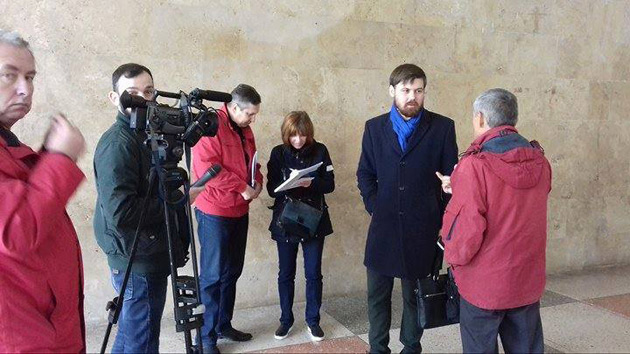
Zasoba does not argue that his organization has a socio-economic aspect and is guided not by strategic, but tactical goals on the principle of "here and now."
"We are a community, not experts and researchers. Our main problem is employment and housing for people," he said, adding that "time will show who contributed to the return of Crimea." "We believe in what we are doing and in the way we are going," he says.
The achievements of the organization include specific cases of solved social problems that activists implement together with local authorities and international organizations.
For example, in Kyiv, where most internally displaced persons stay, the authorities began to give preferences to IDPs who pass their children to kindergartens. And now, in case of problems, parents call Crimean Diaspora, and those, in turn, call a local administration.
"This is our role – we're doing everything that the authorities cannot cope with," Zasoba says.
His only wish for the authorities is to face the problems of IDPs, and then all banking, electoral, land and other problems will be solved.
"The wish for the authorities is to treat us not as an electoral unit, but as citizens of Ukraine. If such political will exists, all the rest is technical issues," Zasoba summed up.
Crimean Tatar Resource Center
The human rights expert organization, Crimean Tatar Resource Center, was established in 2015 on the basis of the Committee for the Protection of Rights of the Crimean Tatar People, which began to work in occupied Crimea. In 2014, amid persecution of activists in Crimea, the organization began monitoring all cases of human rights violations.
After repression against human rights defenders, some activists had to leave Crimea and establish their work in mainland Ukraine, according to Eskender Bariev, the head of the Crimean Tatar Resource Center, a member of the Mejlis of the Crimean Tatar people.
"Today, our organization has three areas of work: human rights, normative and the one related to the promotion of Crimea's de-occupation," he said.

The achievements include the drafting of a long-term strategy of the Crimean Tatar Resource Center, as well as participation in the drafting of the strategy for public diplomacy of the Crimean Tatar people and the implementation of this strategy through participation in international forums within the UN, OSCE, the Council of Europe and the Parliamentary Assembly of the Council of Europe. Together with partners, the Information Policy Ministry and the Ministry of Foreign Affairs of Ukraine and with the support of international funds, the Academy of Public Diplomacy of the Crimean Tatar People has been established. Thus, he believes, the world is constantly talking about Crimea.
According to Bariev, the organization has a network of activists in occupied Crimea who send information about events taking place in Crimea.
"We are expanding our network of activists, maintaining contact and holding seminars for them, including psychological rehabilitation and security, since the topic of protecting activists in Crimea is very relevant. We have a proven methodology - what to do in case of danger. We also try to ensure that the relatives of victims of repression, lawyers and the victims themselves go to international platforms in order to inform the world about Crimea," Bariev said.

Lawyers are also working with victims of repression, complaints and applications are submitted to the European Court of Human Rights and the UN. This is done by two lawyers of the organization.
"By the way, one of our offices is located in Henichesk, Kherson region, where we advise Crimean residents from the occupied territories on obtaining Ukrainian documents - passports, birth certificates, etc. If the matter requires judicial intervention, we try to solve it promptly. For this purpose we even organized a seminar for judges in Kherson region," the Mejlis member said.
In addition, throughout the year the Crimean Tatar Resource Center ensured the appearance of witnesses on a lawsuit investigated by the prosecutor's office of the Autonomous Republic of Crimea about the deportation of 1944 as genocide against the Crimean Tatar people. A total of 110 court hearings have already been held.
In addition to lawyers, the organization has a fundraiser to collect money for ongoing initiatives and projects.
As for the strategy for Crimea's return to Ukraine, Bariev said unequivocally - Crimea should be returned as a territory.
"First of all, we must fight for the territory of Crimea and then work with people if they did not commit criminal offences," the human rights activist said.
Zera Ashirova, Kyiv



